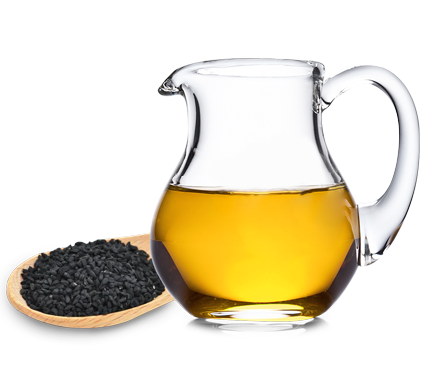Types of Oil
________________________
Cold pressed oils are a type of naturally pressed juice from the seeds of certain plants, which contain only their natural nutritious ingredients, noticeable in their smell and taste. These are unrefined and thermically non-treated oils, which abound with essential fatty acids, fat soluble vitamins, lecithin, phytosterols, and healthy minerals.

CUMIN OIL
Black Cumin plants are a member of the buttercup family. The seeds are small, very dark, thin, and crescent shaped. The seeds, when used in cooking, add a unique nutty flavor to food, in addition to many health benefits. The rich oil of the cumin seed contains powerful compounds. The predominant compound, cuminaldehyde, accounts for up to 40% of the oil content. Aldehydes are rich in naturally occurring oxygen compounds which can interact with human cells to make profound beneficial changes. Other natural compounds includeterpenes, γ-terpinenes, p-cymene, limonene, a-farnesene и carophyllene. These natural constituents possess remarkable antioxidant, antitoxic, anti-microbial, anti-fungal, anti-parasitic, anti-spasmodic and diuretic actions.
Black cumin oil is a clear substance, brownish green in colour, with an oily texture and a characteristically hot spicy odour. This vegetable oil is sensitive to oxidation and must be stored in a cool area (<20°C) free of drafts and light.
Origin and history
It is one the most revered medicinal seeds in history. Though black cumin seeds are mentioned in the Bible as well as in the words of the Prophet Mohammed, who said that The Prophet Mohammed said that the black cumin seed cured every disease except death itself.
Ancient Egyptian Physicians often used the seeds to treat Pharaohs after their lavish feasts to help calm upset stomachs, headaches, toothaches, colds, and infections. The black cumin oil is also known as the oil of the Pharaohs. It is said that Cleopatra and Nefertiti used it as a beauty oil. It was also found in the tomb of Tutankhamun, in order to imbue the pharaoh with brilliant health in the after-life.Also, black cumin was an essential ingredient in many Egyptian meals.
Hippocrates, the grandfather of modern medicine, considered black cumin a valuable remedy for digestive disorders.
Since 1959, black cumin has been examined in more than 200 different studies at universities and laboratories.
Nutrition & health benefits
- Cumin oil contains alpha-linolenic acid, the anti-inflammatory omega-3 fatty acid and linoleic acid the omega-6 fatty acid.
- help fight all sorts of diseases by boosting the production of bone marrow and immune cells.
- helps in the treatment of diseases related to the respiratory system such as asthma, flu, bronchitis etc.
- helps repair tumors and has been proven as very effective in treating tumors of the liver, abdomen and eyes.
- Natural antiseptic and antibiotic
- It stimulates the metabolism and helps prevent weakness and lethargy within the body.
- helps cure nervous disorders such as convulsions, anxiety, stress etc
- It can be used in treatment for nearly all sorts of spasms and associated troubles such as cramps, convulsions, non-stop coughs, pains and cramps.
- It helps to maintain a regular menstruation cycle and helps in recovery from Post Menopause Syndromes.
- Helps to treat headaches, toothaches, nasal congestion, colds and flus, hair and skin problems, allergies, insomnia, diabetes, digestive and gastrointestinal problems…
USES
- Culinary uses
- It is useful in the treatment of heart disease, rheumatism and other inflammatory diseases.
- in foods, beverages, liquors, medicines, toiletries and perfumeries.
- Increase immunity
- weight loss
- against acne
- prevent diabetes



